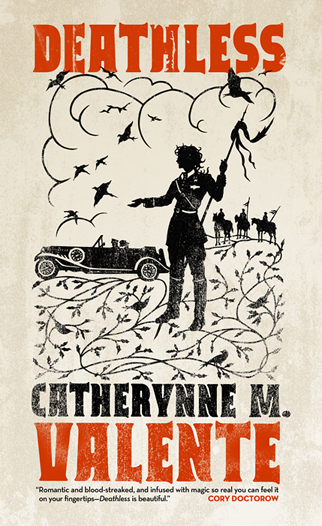Marya Morevna from Saint Petersburg is six years old when she first sees a bird come courting for her eldest sister’s hand.
Marya is her parents’ fourth child, born in the waning era of the Tsars, and the birds keep coming during the first, hungry years of the Russian Revolution. Marya sees them all arrive——one, two, three!——and disguise themselves as dashing young lieutenants before carrying her sisters off. When she grows to womanhood, she watches for a bird of her own… and she resolves to understand the nature of the magic she knows is coming to claim her.
So begins Catherynne M. Valente’s lyrical new novel Deathless, which infuses Slavic folklore into the early days of the U.S.S.R., mixing myth and gritty historical fact with exceptional finesse.
No spoilers below.
As a teen, Marya struggles to adapt to her rapidly changing society, but she is set apart by her family’s erstwhile wealth, her love of poetry, and her unique awareness of magic. She observes the world keenly and is rewarded with the occasional glimpse beyond its facade——she encounters the household domovoi, for example, and accidentally summons a frightening old widow who wants to be her tutor.
In time, of course, a bird does come for her. Marya’s groom is Koshei the Deathless, otherwise known as the Tsar of the Country of Life. Gorgeous, immortal, and occasionally cruel, Koshei is locked in an endless war with his brother, whose empire is, of course, death. This ongoing battle provides a surreal backdrop for Koshei’s romance with Marya, for Deathless is a dark and passionate love story, one that is sexy and disturbing, exhilarating and tragic. It is an apparently simple tale, a fairy story with beguiling prose, writing that leads the reader out onto thin ice, over bottomless freezing depths, in the space of just a few paragraphs.
In case the foregoing hasn’t already made it clear: I loved Deathless. It is one of those books that must be discovered, bit by bit, like a banquet unfolding, and to spoil it——even a little——would be a crime. I will tell you that in most versions of the Koschei story, he is a villain who steals away a human girl, secure in the knowledge that with his soul carefully hidden away, he can’t be killed or otherwise brought to justice. In Valente’s hands, though, this character is something more complex and interesting. Marya’s no easy archetype either: she’s neither a helpless victim nor a seductive traitoress.
I will tell you that the combination of folklore with Soviet history in this book creates any number of surprising delights: Leninist domovoi, for example, and patriotic nursing students who just happen to be rusalka. The author digs into meaty topics like extremism, war, power within marriage, the nature of family and——always——the inevitable defeat that death visits upon all our plans. It is a potent combination and, like any good fairy tale, it stays with you, like an especially sticky dream, edging the stuff of everyday life with glittery shadows, and making it seem entirely possible that something miraculous and a bit terrible might be waiting for you just around the corner.
Deathless is a book with wonders and carnage aplenty, in other words, told in such exquisitely sensual prose that it almost feels dangerous to read it. Like Marya herself, it is lovely and more than a little savage; perhaps too beautiful to comfortably bear. Catherynne M. Valente may break your heart a little with this novel, but somehow, I’m betting, you won’t be sorry.
A.M. Dellamonica writes novels and short fiction and teaches writing online. She is passionate about environmentalism, food and drink, and art in every form, and dabbles in several: photography, choral music, theater, dance, cooking and crafts. Catch up with her on her blog here.











Wow, thank you for this review. After reading this and checking out the excerpt on the web site, I’m thoroughly hooked, and I don’t think I would have noticed this book otherwise. Looking forward to reading it!